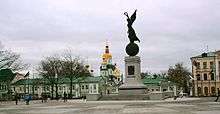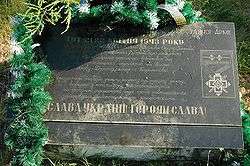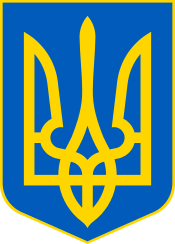Glory to Ukraine
Glory to Ukraine (Ukrainian: Слава Україні! Героям слава!, Slava Ukraini! Heroiam slava!; translated as: Glory to Ukraine! Glory to the heroes!) is a Ukrainian national salute. It appeared at the beginning of 20th century in different variations, then became wildly popular among national Ukrainians during Ukrainian War of Independence of 1917–21[1].

History
20th century

The phrase “Slava Ukraini!” (Glory to Ukraine!) first appeared in different military formations during the Ukrainian War of Independence (from 1917 to 1921).[2] It became part of the lexicon of Ukrainian nationalists in the 1920s.[2][nb 1]
The modern response "Heroiam slava!" (Glory to the heroes!) appeared in the 1930s among members of the Organization of Ukrainian Nationalists (OUN) and Ukrainian Insurgent Army (UPA) who started using this slogan,[2] replacing all former responses with it as a mark of deep respect for all the men and women who had laid down their lives for their country. The partisans thus honoured the memory of all the brave soldiers and passed it on to future generations. The greeting Glory to Ukraine! Glory to the heroes! became an official slogan of Stepan Bandera's OUN-B in April 1941.[3][2]
“Slava Ukraini! Heroiam slava!" became very popular in the 1940s and 1950s when the OUN/UPA partisan movement fighting against the Polish and Soviet occupiers swept across most of western Ukraine. "Glory to the heroes!" was also used by the Kuban Cossacks dating back to at least 1944 with the return of the Cossack Rebel Army who fought with the UPA.[4]
In the late 1980s and early 1990s the slogan began to be heard at rallies and demonstrations.[2] After Ukraine declared independence in 1991, the phrase "Glory to Ukraine" became a common patriotic slogan. In 1995, President of the United States Bill Clinton used the phrase in his speech in Kiev (together with "God bless America").[5]
21st century
The phrase has undergone a resurgence in recent times, becoming a popular and prominent refrain during the 2014 Ukrainian revolution.[6] In September 2014, after addressing a gathering of the United States Congress in Washington, D.C., Ukrainian president Petro Poroshenko concluded his speech by uttering the phrase.[7]
It is also commonly used in greeting to Ukraine from the world leaders.[8]
On July 10, 2018, Ukrainian supporters flooded the Facebook page of football governing body FIFA with over 158,000 comments, most saying "Glory to Ukraine", after FIFA fined Croatia's assistant coach for a video in which he used the same slogan after Croatia's World Cup victory. Russia alleged that the chant has ultra-nationalist connotations, as it was popularised by World War II era groups, such as the Organisation of Ukrainian Nationalists (OUN), who collaborated with the Nazis.[9] The Football Federation of Ukraine said in a statement that "Glory to Ukraine is a commonly used greeting in Ukraine ... (and) should not be interpreted as an act of aggression or provocation".[10]
On 9 August 2018 Ukrainian President Petro Poroshenko announced that Glory to Ukraine will be the official greeting of the Armed Forces of Ukraine, replacing Hello Comrades (Вітаю товариші, Vitayu tovaryshi).[11] The greeting was used during the Kiev Independence Day Parade on 24 August 2018.[12] The Ukrainian parliament approved the President's bill on this (in its first reading) on 6 September and on 4 October 2018.[13] Parliament also made Glory to Ukraine the official greeting of the National Police of Ukraine.[14]
On 7 September 2018, the Ukrainian national football team wore the phrase on their kits, during a UEFA Nations League match with the Czech Republic.[15]
Controversies
In the Soviet Union the slogan “Slava Ukraini!” was forbidden and discredited in a decades long propaganda campaign alongside the Ukrainian nationalists who used it.[6][2] They were dubbed "Nazi henchmen".[6] Modern Russia followed the similar trend when stereotyped the slogan as a fascist slogan, notably during the Ukrainian crisis.[16]
Beyond the border of Europe, the song Glory to Hong Kong drew inspiration from the slogan for use in the 2019–20 Hong Kong protests.[17] This was received extremely negatively in mainland China, with the disinformation from Chinese nationalist propaganda accusing Ukraine of meddling in Hong Kong affairs under the order of the United States, and was not censored by the Great Firewall of the Chinese government.[18][19]
See also
- Glory to Hong Kong, which is influenced from the slogan.
Notes
- In his monumental book Kholodny Yar, Yuriy Horlis-Horskyi writes that he heard this phrase from several insurgents, who fought in the Kholodny Yar Ukrainian partisan movement (1918-1923). They routinely greeted each other with the phrase “Slava Ukraini!”, and the response had to be “Ukraini Slava!” (which also means "Glory to Ukraine" but with words swapped around).[2]
References
- ""Glory to Ukraine!": Who and when was the slogan created?". www.istpravda.com.ua. Retrieved 2020-06-21.
- Why Is the International Media Still Repeating Kremlin Propaganda about Ukraine?, Atlantic Council (13 July 2018)
(in Ukrainian) "Glory to Ukraine!" - the story of the slogan of the struggle for independence, Radio Free Europe (19 June 2017) - Ivan Katchanovski (2004). "The Politics of World War II in Contemporary Ukraine". The Journal of Slavic Military Studies. p. 214.
- Родом з України [Born in Ukraine]. The Ukrainian Week (in Ukrainian). 29 June 2011. Retrieved 28 December 2014.
- Jehl, Douglas (13 May 1995). "Thousands Turn Out to Cheer Clinton in Ukraine". The New York Times. Retrieved 10 July 2018.
- "New 'Glory to Ukraine' army chant invokes nationalist past". Deutsche Welle. 24 August 2018.
- Poroshenko, Petro (18 September 2014). "Ukrainian President Address to Congress". C-SPAN. Washington, D.C.: C-SPAN. Retrieved 30 November 2018.
- kotyhoroh (2018-07-09), How FIFA chose to become part of the Russian propaganda narrative (Short version), retrieved 2018-07-10
- "World Cup 2018 Gets Political: The Nazi and anti-Russian Roots of 'Glory to Ukraine'". Ha'aretz. 15 July 2018.
- "Angry Ukraine Fans Deluge FIFA's Facebook Page With Posts". The New York Times. Retrieved 2018-07-11.
- Poroshenko, Petro. "President: The words "Glory to Ukraine! Glory to the Heroes!" will be the official greetings of the Armed Forces of our state". PRESIDENT OF UKRAINE Official website. Government of Ukraine. Retrieved 11 August 2018.
- "Ukraine's Independence Day military parade in Kyiv". The Ukrainian Week. Retrieved 24 August 2018.
- Verkhovna Rada approves military salute ‘Glory to Ukraine!’, 112 Ukraine (6 September 2018)
Ukraine's parliament approves new army, police greeting, UNIAN (4 October 2018) - Rada approves salute 'Glory to Ukraine' in Ukrainian army, Interfax-Ukraine (4 October 2018)
- "'Glory to Ukraine' slogan appears at official kits of national football team". 112.international. Retrieved 2018-09-07.
- https://www.stalkerzone.org/vladimir-kornilov-there-is-no-difference-between-sieg-heil-and-slava-ukraini/
- https://www.wilsoncenter.org/blog-post/hong-kong-protesters-draw-inspiration-ukraines-maidan
- https://zhuanlan.zhihu.com/p/81933448
- https://www.guancha.cn/internation/2019_12_03_527229.shtml
